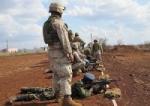... Today, human rights groups say, there are 300,000 child soldiers worldwide. And experts say the problem is deepening as the nature of conflict itself changes ó especially in Africa.
Here, in one country after another, conflicts have morphed from idea- or cause-driven struggles to warlord-led drives whose essential goal is plunder. Because those new rebel movements are motivated and financed by crime, popular support becomes irrelevant. Those in control donít care about hearts and minds. They see the local population as prey.
The result is that few adults want to have anything to do with them, and manipulating and abducting children becomes the best way to sustain the organized banditry.
This dynamic has fueled some of the longest-running conflicts on the continent, and it could be seen this month alone in at least three countries...












Bookmarks